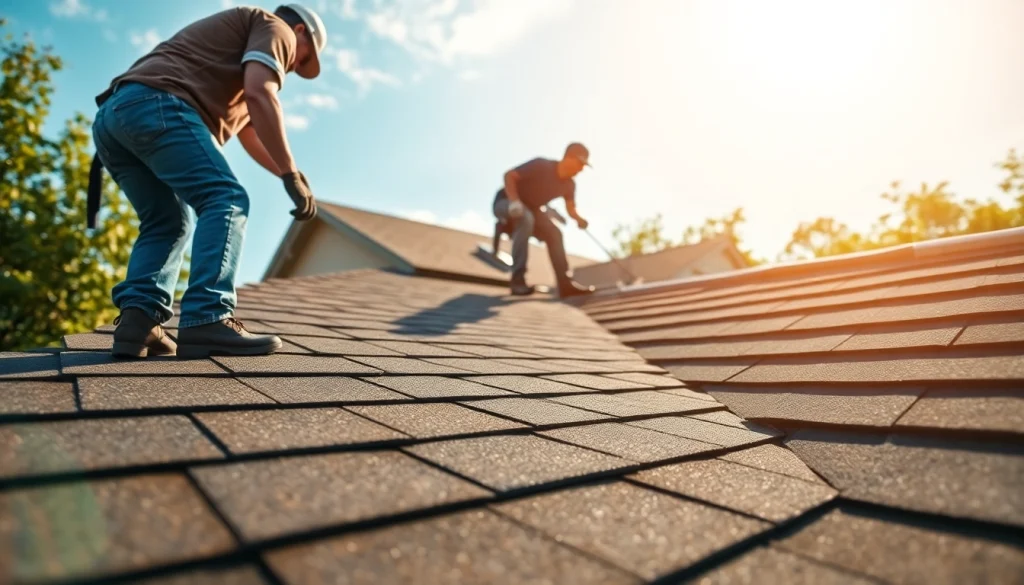Understanding Asphalt Shingle Roofing in Texas
Asphalt shingle roofing has become increasingly popular among homeowners in Texas due to its durability, cost-effectiveness, and variety. This roofing option offers a blend of aesthetics and functionality that appeals to many residents. Whether you’re building a new home or considering a roof replacement, understanding asphalt shingle roofing Texas provides valuable insights into what may be the best choice for your roofing needs.
Overview of Asphalt Shingle Types
Asphalt shingles come in various types, primarily divided into two categories: 3-tab shingles and architectural shingles.
- 3-Tab Shingles: This traditional style features a flat profile and is generally less expensive than other types. It’s well-suited for moderate climates, making it a popular option for budget-conscious homeowners.
- Architectural Shingles: Also known as dimensional or laminate shingles, these are thicker and offer a more aesthetically pleasing appearance with a multi-dimensional profile. They have superior durability and come in a variety of colors and styles, making them a fashionable choice for many Texas homes.
- Luxury Shingles: These high-end shingles mimic the look of slate or wood shakes, offering unmatched aesthetics and higher longevity, although at a premium price point.
Benefits of Asphalt Shingles in Texas Weather
The unique climate conditions of Texas—characterized by intense heat, high winds, and occasional hail storms—necessitate a roofing material that can withstand these elements. Asphalt shingles are designed to excel in such adverse conditions;
- Heat Resistance: Asphalt shingles reflect solar heat, keeping homes cooler in the scorching Texas summer.
- Wind Resistance: Many asphalt shingles are designed to resist uplift in high winds, ensuring that your roof remains intact during stormy weather.
- Hail Damage Protection: Selecting high-impact rated asphalt shingles can dramatically reduce the risk of hail damage.
Moreover, asphalt shingles are relatively lightweight, which reduces the load on the building structure while still providing strength and durability.
Cost Considerations for Texas Homeowners
Roofing costs can vary significantly based on the type of shingle selected and the overall complexity of the roof layout. Factors affecting costs include:
- Material Type: Premium architectural shingles typically cost more than standard 3-tab shingles but offer longer lifespans and greater protection.
- Labor and Installation: The complexity of installation can also affect pricing, with steep or multi-faceted roofs generally costing more to install.
- Geographic Location: Prices can vary across Texas depending on demand for roofing services in the area.
On average, homeowners can expect to pay between $340 to $450 per square for a new asphalt shingle roof in Texas, but it is essential to obtain detailed quotes from qualified contractors to get an accurate estimate.
Installation Process for Asphalt Shingle Roofing
Preparing for Installation
Proper preparation is crucial for a successful asphalt shingle installation. Homeowners should begin by conducting a thorough inspection of their existing roof to determine the need for replacement or underlayment repairs.
Choosing a reputable roofing contractor skilled in asphalt shingle installation is paramount. Verify their licenses and insurance, and request references or reviews from previous customers.
Steps in the Installation Process
The installation of asphalt shingles follows a systematic approach to ensure quality and longevity:
- Remove Old Roofing: If an old roof exists, it must be removed meticulously. This process involves stripping away old shingles and inspecting the underlying structural components for any signs of damage.
- Install Underlayment: A layer of roofing felt or synthetic underlayment is installed over the roof deck to provide additional moisture protection and secure the shingles.
- Shingle Installation: Starting at the bottom edge, shingles are laid in overlapping rows, typically using nails specific to the material. Valleys and ridges will require special attention to ensure no leaks form.
- Install Flashing and Ventilation: Proper ventilation is critical. Venting ensures longevity by dissipating heat and moisture. Flashing around chimneys and vents must also be applied correctly to prevent leaks.
- Final Inspection: The completed roof should be thoroughly inspected for quality and any inconsistencies.
Choosing the Right Contractors
Selecting the right contractor goes beyond just comparing quotes. Consider the following criteria:
- Experience: Choose contractors with extensive experience in asphalt shingle roofing.
- Certifications: Look for roofing professionals certified by major shingle manufacturers, which often reflects a higher standard of workmanship.
- Warranty Offers: Inquire about warranties on both materials and labor to protect your investment.
Maintenance and Care for Asphalt Shingle Roofing
Routine Inspections and Cleanings
Regular maintenance is crucial for prolonging the life of your asphalt shingle roof. Homeowners should schedule annual inspections, preferably in the spring or fall, to check for:
- Missing or damaged shingles.
- Debris accumulation in gutters and valleys.
- Signs of moisture damage or leaks.
Cleaning is equally important; homeowners can remove leaves and debris to prevent moss growth and reduce the risk of water accumulation.
Common Repairs for Asphalt Shingles
Even with proper maintenance, repairs may be needed. The most common issues include:
- Curled or Buckled Shingles: Can be reattached or replaced if damage is severe.
- Leaks: Found in areas where shingles overlap or around chimneys, necessitating prompt repair to prevent further damage.
- Granule Loss: If granules are missing, it can expose internal layers to the elements, increasing the risk of leaks. Prompt replacement is essential.
Extending the Lifespan of Your Roof
To maximize the lifespan of your asphalt shingle roof, consider implementing the following tips:
- Regularly clear gutters and downspouts to prevent blockages and water backup.
- Ensure that trees are trimmed back to reduce the risk of falling branches.
- Install ridge vents to enhance ventilation, helping to prevent moisture buildup that can cause rot.
Comparing Asphalt Shingles with Other Roofing Materials
Asphalt vs. Metal Roofing
Metal roofing is another popular choice among homeowners, especially for its longevity and durability. However, asphalt shingles have several advantages:
- Initial Cost: Asphalt shingles are typically less expensive to install than metal roofs.
- Aesthetics: Asphalt shingles come in various colors and designs, offering more options than most metal roofs.
- Noise: Metal roofs may produce noise during rain or hail, while asphalt shingles provide better sound insulation.
Asphalt vs. Tile Roofing
Tile roofing, such as clay or concrete tiles, is often praised for its beauty and longevity, but it also comes with drawbacks:
- Weight: Tile roofs can be significantly heavier, requiring additional reinforcement of the roof structure.
- Cost: Tiles are among the most expensive roofing options, making asphalt a more budget-friendly alternative.
- Installation Complexity: Tile installation is more labor-intensive, increasing installation times and costs.
Environmental Impact Considerations
As awareness of environmental impacts rises, many homeowners are concerned about their roofing choices:
- Asphalt shingles are recyclable, and many manufacturers have adopted practices to reclaim shingles at the end of their life cycle.
- Some asphalt shingles come with energy-efficient reflective coatings that can help reduce energy costs.
- Reflective properties also minimize the urban heat island effect in densely populated areas.
Innovations in Asphalt Shingle Technology
New Materials and Durability Enhancements
Recent advancements in roofing technology have led to improved materials that enhance the durability and longevity of asphalt shingles:
- Impact-resistant shingles are designed to endure extreme weather conditions, making them ideal for Texas storms.
- Some manufacturers have developed algae-resistant shingles that prevent unsightly stains and prolong roof aesthetics.
Energy Efficiency of Modern Shingles
Energy efficiency is crucial for many homeowners, especially in regions like Texas where cooling costs can be significant. Innovations include:
- Cool roof shingles that reflect more sunlight, reducing heat absorption and helping to lower energy costs.
- Smart shingles equipped with solar panels that allow homeowners to generate their own electricity.
Future Trends in Asphalt Roofing in Texas
The future of asphalt shingle roofing is being shaped by evolving consumer preferences, environmental concerns, and technological innovations. As homeowners seek more sustainable options:
- Expect increased availability of eco-friendly materials and products.
- Smart roofing solutions such as integrated monitoring systems will become more mainstream.
- Growing emphasis on longevity and durability will drive manufacturers to innovate further.



